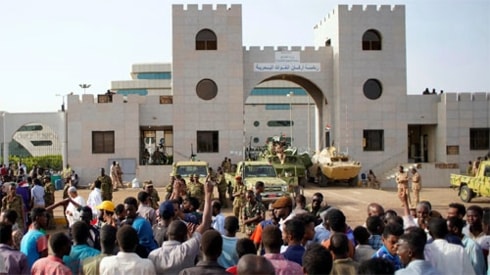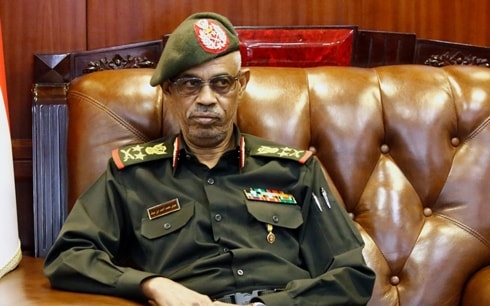Sudan: 36 casualties after protests, UN calls on all sides to exercise restraint
Sudanese police said 16 people were killed and 20 others injured during protests in the capital Khartoum on April 11-12.
On April 12, German Ambassador to the United Nations Christoph Heusgen, rotating President of the United Nations Security Council, said that five European countries that are members of this council have requested to hold a meeting to assess the situation in Sudan.
This move comes after the situation in Sudan continued to have complicated developments, despite Defense Minister Ahmed Awad Ibn Auf announcing his resignation as head of the Transitional Military Council.
|
| Sudanese Defense Minister Ahmed Awad Ibn Auf announced his resignation as head of the Transitional Military Council. Photo: Al Jazeera |
Answering reporters after the closed consultation session of the United Nations Security Council, Ambassador Heusgen said that the United Nations Security Council could hold a meeting on Sudan on April 15 based on the request of five countries: Britain, France, Belgium, Poland and Germany if the situation in Sudan becomes serious.
Mr. Heusgen also called on the parties involved in Sudan to exercise restraint: “We believe that there will be a peaceful solution to the current problem in Sudan. However, these solutions must reflect the will and aspirations of the Sudanese people. The situation in Sudan is very complex. We need a credible and inclusive political process to achieve the transition of power that we want.”
Ambassador Heusgen's statement comes as tensions in Sudan continue to escalate. Sudanese police reported that 16 people were killed and 20 others were injured during protests in the capital Khartoum on April 11-12.
In addition, the protests and marches have also affected traffic and led to large-scale traffic jams in the Sudanese capital. Currently, protesters are still pouring into the streets to welcome the news that Defense Minister Ahmed Awad Ibn Auf announced his resignation as head of the Transitional Military Council.
Earlier in the day, Sudanese Defense Minister Ahmed Awad Ibn Auf announced that he would step down as head of the country's Transitional Military Council. In a speech on national television, Ahmed Awad Ibn Auf said Lieutenant General Abdel Fattah Abdelrahman Burhan would be the new leader of the Transitional Military Council.
General Ibn Auf stated: “I, the head of the military council, announce that I am resigning from this position to choose a person with expertise and capacity that I can trust to appoint to this position. I believe that the head of the transitional military council will have enough capacity to bring the Sudan ship to shore. After consideration, I decided to choose Lieutenant General Burhan as Chairman of the Transitional Military Council.”
Meanwhile, General Omar Zain al-Abdin, head of the Transitional Military Council's political committee, told diplomats that the removal of President Omar al-Bashir was not a "military coup." Mr. al-Abdin affirmed that the transfer of power would be carried out "as soon as possible" and that the military was not part of the political process in Sudan.
According to Mr. al-Abdin, the army's actions are to protect the country from unrest and a new civilian government can be established within a month if it is formed. The army will act to meet the aspirations of the people. Mr. al-Abdin called on the Sudanese people, civil society organizations and the country's political elite to join the dialogue to find solutions to the country's economic problems.
 |
| Protesters gathered in front of the Ministry of Defence after the army announced that President Omar Hassan al-Bashir would be replaced by a Transitional Military Council. Photo: Reuster |
However, shortly after, the same day, the Sudanese State News Agency (SUNA) reported that Sudan's Transitional Military Council would postpone its meeting with political parties and forces until an unspecified time. The parties must first nominate two representatives and register their names by April 13.
The situation in Sudan has become tense after consecutive protests that began on December 19, 2018, when people protested against sharp increases in food prices and were dissatisfied with the government's weak economic policies that made people's lives more difficult.
Following the arrest of President Omar al-Bashir, the Sudanese military has imposed a month-long nationwide nighttime curfew from 10 p.m. to 4 a.m. local time. Sudan's main protest group has rejected the military's announcement and called for continued protests.

